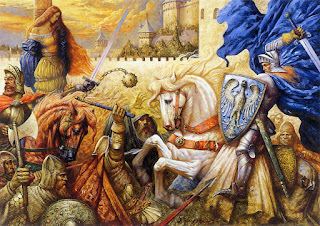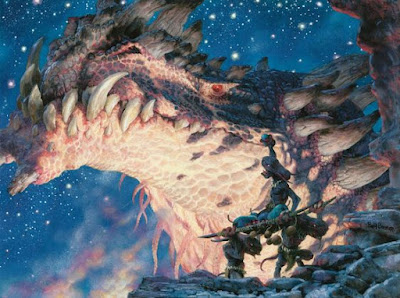Knights of the Divine Lady
It is said in the elder days when the gods ruled from Ma'at that Klazath ruled while the Seer Father dreamed. Klazath was in charge of the glorious armies that drove back the formless shadows of Chaos as Choranus' dreams shaped the world, but Klazath's zealotry made life in Ma'at oppressive for its people. Gorhan, his brother, pleaded with Klazath to let up in his driving of the men, but Klazath would do no such thing until every last ounce of foul Chaos was destroyed. Gorhan was saddened. He despaired at the soldiers' lives, fighting forever without purpose or rest. He looked into the crystal pond that surrounded the sleeping Choranus and saw his own reflection. Before his eyes, his image was transformed into the very picture of infinite beauty. She was a woman like none he had seen but as he reached in to touch her, his hand pulled out a marvelous golden helm. From then on Gorhan knew what must be done.
Somewhere out there, his Lady watched him. Somewhere among the chaotic maelstrom was her fathomless beauty. He gathered the dreamers, the poets, and the artists. He named them his Knights of the Divine Lady. So Gorhan and his knights-errant charged into the darkness, seeking his Lady above all else, cutting a great swath through the minions of evil. Their quests were not so efficient as Klazath's crusade, but their magnificent bravery gave hope to all the people. They learned to sing songs again, telling stories of their remarkable triumphs. The crusaders of Klazath were strengthened by the hope the knights-errant created and so the grand Quest was begun.
The Knights of the Divine Lady are an order that persists to this day. They quest for holy artifacts, slay mighty creatures, and seek beauty above all else.
Here is some inspiration:
At some point, the Knights of the Divine Lady came to especially hate the Fae. It is said that a particularly beautiful Fae Lady convinced him that she was his Lady, and after he discovered her treachery, he declared eternal war on the Fae.
Any Lawful non-Wizard or Elf character may join the Knights but clerics may only cast the spell.
The Quest:
A knight-errant may at any time, declare that they are embarking on a Holy Quest. The knight must declare what would constitute the Quest's completion. The Quest must involve retrieving a holy artifact, destroying a specific monster, taking a specific place, or rescuing a person of good character in distress. While on the Quest, a knight errant gains many powers that are detailed below. A knight-errant may not regain these powers until he has completed his Quest. Any knight that abandons a Quest loses access to all powers and spells from this Order until they are given absolution by another member of the Order.
What Matter Wounds?:
A knight in pursuit of a holy Quest gains a pool of d6s equal to double his level. A knight-errant may use any number of these as an action to heal himself. A knight that is affected by a spell that would put them below 1 HP may spend one of these dice to immediately nullify the damage.
Woe to the Wicked:
A knight-errant on a holy Quest gains a bonus to their attack roll and damage equal to their level against Chaotic characters.
Vengeance of the Helmed One:
A knight-errant gains +1d6 to all attacks, damage rolls, and saves when battling against Fae and cannot be affected by Fae Mind Control Spells.
Spell Casting:
A knight of this Order gains a Spell Casting bonus equal to their level. Clerics cast these spells with their usual bonus. All casters take Disapproval as a cleric would.
Summon Steed:
Level 1 Range: N/A Casting Time: 1 Action Save: N/A
General: The caster reflects on his eternal quest and repeats whatever creed was used to swear them into the Order, causing a magic steed to arrive from realms unknown that will obey the caster. A knight on a Quest gains a +2 to this check.
Manifestation: Roll 1d4: (1) The horse emerges through a shining portal, (2) The horse forms out of mist, (3) The horse gallops down from the sky, (4) The caster simply finds themselves atop the horse.
1-11: Failure
12-13: The steed is a superior example of his kind but is otherwise just a mundane horse. The horse remains until dismissed.
14-17: The steed can never be exhausted and the rider gains +2 AC and immunity to Magic Missile whist on the steed. The horse remains for a day.
18-23: The steed, in addition to all previous benefits, may run up impossible inclines without difficulty and leap great distances. The horse remains for 1 day.
24-27: The steed, in addition to all previous benefits, may walk on water and pass from plane into another.
28+ The steed, in addition to all previous benefits, may fly and the rider gains +4 AC and immunity to all offensive magic. The horse remains for a day.
Somewhere out there, his Lady watched him. Somewhere among the chaotic maelstrom was her fathomless beauty. He gathered the dreamers, the poets, and the artists. He named them his Knights of the Divine Lady. So Gorhan and his knights-errant charged into the darkness, seeking his Lady above all else, cutting a great swath through the minions of evil. Their quests were not so efficient as Klazath's crusade, but their magnificent bravery gave hope to all the people. They learned to sing songs again, telling stories of their remarkable triumphs. The crusaders of Klazath were strengthened by the hope the knights-errant created and so the grand Quest was begun.
The Knights of the Divine Lady are an order that persists to this day. They quest for holy artifacts, slay mighty creatures, and seek beauty above all else.
Here is some inspiration:
At some point, the Knights of the Divine Lady came to especially hate the Fae. It is said that a particularly beautiful Fae Lady convinced him that she was his Lady, and after he discovered her treachery, he declared eternal war on the Fae.
Any Lawful non-Wizard or Elf character may join the Knights but clerics may only cast the spell.
The Quest:
A knight-errant may at any time, declare that they are embarking on a Holy Quest. The knight must declare what would constitute the Quest's completion. The Quest must involve retrieving a holy artifact, destroying a specific monster, taking a specific place, or rescuing a person of good character in distress. While on the Quest, a knight errant gains many powers that are detailed below. A knight-errant may not regain these powers until he has completed his Quest. Any knight that abandons a Quest loses access to all powers and spells from this Order until they are given absolution by another member of the Order.
What Matter Wounds?:
A knight in pursuit of a holy Quest gains a pool of d6s equal to double his level. A knight-errant may use any number of these as an action to heal himself. A knight that is affected by a spell that would put them below 1 HP may spend one of these dice to immediately nullify the damage.
Woe to the Wicked:
A knight-errant on a holy Quest gains a bonus to their attack roll and damage equal to their level against Chaotic characters.
Vengeance of the Helmed One:
A knight-errant gains +1d6 to all attacks, damage rolls, and saves when battling against Fae and cannot be affected by Fae Mind Control Spells.
Spell Casting:
A knight of this Order gains a Spell Casting bonus equal to their level. Clerics cast these spells with their usual bonus. All casters take Disapproval as a cleric would.
Summon Steed:
Level 1 Range: N/A Casting Time: 1 Action Save: N/A
General: The caster reflects on his eternal quest and repeats whatever creed was used to swear them into the Order, causing a magic steed to arrive from realms unknown that will obey the caster. A knight on a Quest gains a +2 to this check.
Manifestation: Roll 1d4: (1) The horse emerges through a shining portal, (2) The horse forms out of mist, (3) The horse gallops down from the sky, (4) The caster simply finds themselves atop the horse.
1-11: Failure
12-13: The steed is a superior example of his kind but is otherwise just a mundane horse. The horse remains until dismissed.
14-17: The steed can never be exhausted and the rider gains +2 AC and immunity to Magic Missile whist on the steed. The horse remains for a day.
18-23: The steed, in addition to all previous benefits, may run up impossible inclines without difficulty and leap great distances. The horse remains for 1 day.
24-27: The steed, in addition to all previous benefits, may walk on water and pass from plane into another.
28+ The steed, in addition to all previous benefits, may fly and the rider gains +4 AC and immunity to all offensive magic. The horse remains for a day.



Comments
Post a Comment